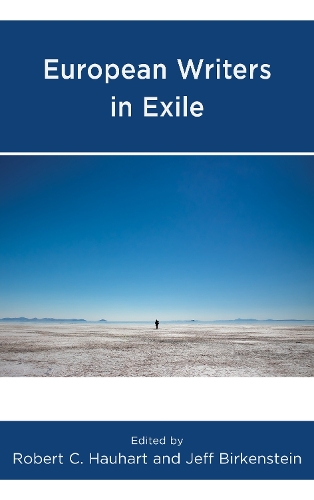
European Writers in Exile
(Hardback)
Publishing Details
European Writers in Exile
By (Author) Robert C. Hauhart
Edited by Jeff Birkenstein
Contributions by Katherine Ashley
Contributions by Katarzyna Balzewska
Contributions by Rowena Clarke
Contributions by Johannes Evelein
Contributions by Charlotte Fiehn
Contributions by Irina Golovacheva
Contributions by Shmuel Lederman
Contributions by Liani Lochner
Bloomsbury Publishing PLC
Lexington Books
26th October 2018
United States
Classifications
Professional and Scholarly
Non Fiction
Comparative literature
Literary studies: general
809.8920691
Physical Properties
Hardback
304
Width 158mm, Height 230mm, Spine 30mm
812g
Description
European Writers in Exile collects a series of original essays that address the writers universal existential dilemma, when viewed through the lens of exile: who am I, where am I from, and what do I write, and to whom While we often understand the term exile to refer to writers who have either been forced to leave their home country or region or chosen self-exile, this term need not be defined so narrowly, and the contributors to this volume explore a range of interesting and evolving definitions. Various countries in Europe have long been both a refuge for people and writers from many countries and a strife-torn region which has forced many to flee within the continent or beyond it. The phrase in exile involves writers moving across borders in multiple directions and for multiple reasons, including for reasons of duress or personal quest, and these themes are addressed and critiqued in these essays. This volume naturally examines the cataclysmic and near-universal exilic experiences relating to the world wars, including essays on Thomas Mann, Vladimir Nabokov, Hannah Arendt and Leo Strauss. Additionally, essays address the unique early twentieth-century experiences of Emile Zola, Franz Kafka, Joseph Conrad, and James Joyce. More contemporary essay subjects include Milan Kundera, Norman Manea, Eva Hoffman, Caryl Phillips, and W. G. Sebald. This collection of transnational, globalized European literature studies envisions understanding the intersection of our contemporary world and various writers in exile in new cultural, historical, spatial, and epistemological frameworks. How does literary production in an increasingly globalized worldwhen seen from exileaffect a view back towards a country or region left behind Or, conversely, how does exile push a writer to look outward to new (trans-)nationalized space(s) These and other questions are important to investigate. Taken in sum, European Writers in Exile offers an academically rigorous, important, and cohesive volume.
Reviews
After a plethora of books on narrowly focused groups of literary exiles, literary exile destinations, or the conditions from which political, literary and other exiles have escaped, this volume does something very new and valuable.It examines the experience of exile, across time and geography, to provide readers with new ideas and angles to understand the phenomenon itself.Birkenstein and Hauhart have done a great service for all readers interested in exiled artists, and given us much to think about as we consider further research. -- Richard Bodek, College of Charleston
Author Bio
Robert C. Hauhart is professor in the Department of Society and Social Justice at Saint Martin's University, Lacey. Jeff Birkenstein is professor of English at Saint Martin's University, Lacey.
